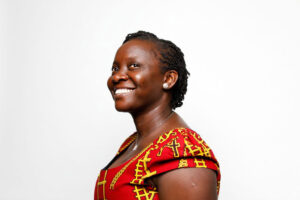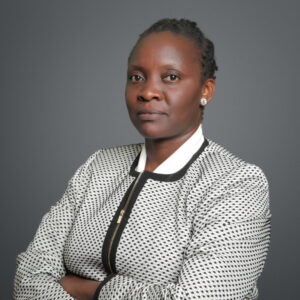Victoria Nyanjura
Credentials
Humanitarian Cause
Healthcare and Food Security, Violence and Abuse, Human Rights, Sexual and Gender-Based Violence, Social Stigma, Human Rights Advocacy, Restoration of Justice, Women’s Rights, Policy and Legislation Improvement, Emergency Response, Supporting communities in climate-vulnerable regions
Impact Location
Uganda
Occupation
Activist / Founder of Women in Action for Women
Photo Gallery
About
Victoria Nyanjura is a prominent women’s rights advocate and community activist from Uganda, best known as the founder of Women in Action for Women (WAW). This organization focuses on empowering women and young people through vocational training, business education, and assistance in accessing essential services. Victoria’s activism is deeply personal—as a teenager, she herself endured years of captivity under the Lord’s Resistance Army (LRA), during which she experienced unimaginable hardship and abuse. Her resilience and dedication have since driven her to advocate for survivors’ rights and push for systemic changes to support those affected by violence and conflict.
Born around 1982 in Oyam District in Northern Uganda’s Lango sub-region, Victoria grew up in a close-knit, humble family. She attended local schools, including St. Mary’s College Aboke, a high school in Kole District. Her life took a harrowing turn in 1996, at age 14, when she was one of 139 girls abducted from her school by LRA rebels. Despite the brave intervention of her deputy headmistress, Sister Rachele Fassera, who negotiated the release of 109 girls, Victoria was among the 30 young women retained by the rebel group. She spent the next eight years in captivity, forced to endure physical, psychological, and sexual abuse. After managing a difficult escape, she found her way home and began the challenging process of rebuilding her life.
“In an instant, my dreams of becoming an engineer or an accountant vanished. In an instant, I was ripped from my bed at gunpoint, beaten and forced into the ranks of the countless many known throughout the world as the physically and sexually exploited.”
Victoria’s path toward education and advocacy was motivated by a desire to turn her painful experiences into positive action. She resumed her education at age 22, despite the demands of caring for her two children born during captivity. With unwavering determination, she completed a bachelor’s degree in development studies from Kyambogo University in Kampala. Later, she pursued further education at the University of Notre Dame, where she obtained a master’s in Global Affairs, specializing in International Peace Studies. This advanced education not only deepened her understanding of justice but also connected her with a global network of activists and resources to support her work in post-conflict advocacy.
Initially volunteering with the Justice & Reconciliation Project (JRP) in Gulu, an NGO focused on rehabilitating communities affected by war in Northern Uganda, Victoria later joined the organization’s Gender Justice department. There, she worked to support women who, like herself, had survived gender-based violence and were often marginalized by their communities. Additionally, her role with the International Justice Mission (IJM) saw her protecting the property rights of Ugandan widows, who are frequently at risk of property expropriation following their husbands’ deaths. Through these roles, Victoria developed a comprehensive understanding of the legal and social challenges facing survivors of violence, which she brought to her work with WAW.
In founding Women in Action for Women, Victoria created a supportive environment for survivors, emphasizing self-sufficiency and mutual aid. WAW empowers women through practical skills training and resources that enable them to start small businesses, gain financial independence, and reduce reliance on external aid. Victoria’s leadership has helped transform WAW into a powerful network that connects women across isolated communities in Uganda, providing them with critical resources, legal assistance, and a platform to voice their needs.
“Collective action is strength, so please embrace and guard it jealously. To stop violence, especially against women and girls, education is key.”
Victoria’s advocacy extends beyond Uganda. As a founding member of the Global Survivor Network’s Leadership Council, she collaborates with international organizations to promote justice and rehabilitation for survivors worldwide. In 2024, she was appointed Chair of the United Nations Voluntary Trust Fund (UNVTF), a role that further solidifies her status as a global leader in human rights. Through her position with the UNVTF, she works to amplify the voices of survivors and drive policy initiatives that address the needs of women and children impacted by conflict. This role allows her to contribute directly to high-level discussions on global strategies for reducing violence against women and ensuring that survivors receive the support necessary for healing and recovery.
Victoria’s experiences and advocacy have brought her international recognition, such as the Navarra International Solidarity Award, which she received alongside three other African women leaders for advancing the United Nations Sustainable Development Goals. The award, presented by the Government of Navarre and the Spanish credit union Laboral Kutxa, highlights Victoria’s exceptional efforts in supporting peace and development initiatives.
“I received support from my family, had access to healthcare, and could take care of my kids. Other survivors might not have that support. While tackling violence, we should also address the holistic needs of survivors—such as education, economic empowerment, healthcare, and removing stigma.”
Victoria’s dedication to education, advocacy, and community building demonstrates her belief in the potential for a better future. Today, she serves as the head of St. Bakhita Vocational Training Centre in Uganda, where she implements innovative projects in collaboration with the University of Notre Dame. Through her leadership, she empowers young people with the skills and resources to break cycles of poverty and violence, proving that sustainable peace and development are achievable with the right support and determination.


